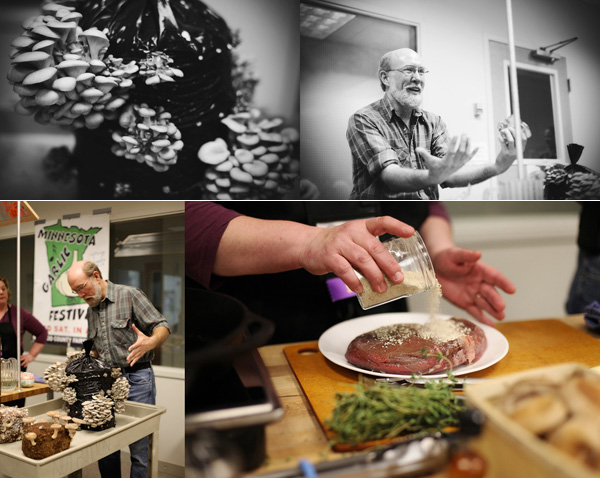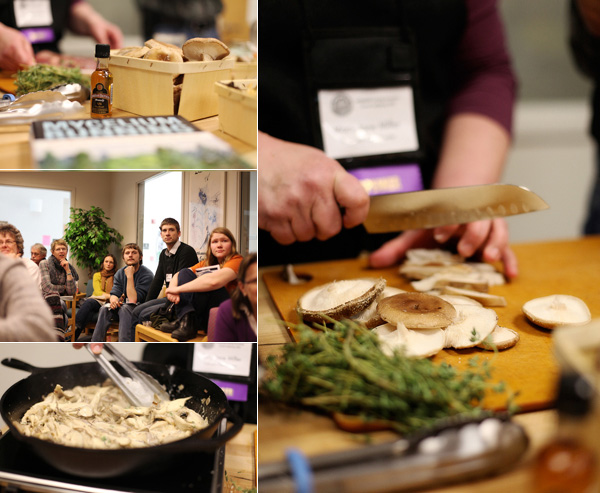
Chances are if you dig mushrooms, you’ve tasted some of Kevin Doyle’s. He is the hard-working guy behind Forest Mushrooms, the largest commercial mushroom farm in Minnesota (also check out The Mikeology Store and Cherry Tree House Mushrooms). We met Kevin Doyle at the 2012 SFA Conference in St. Joseph, MN, where he presented a session on growing mushrooms, with recipe developer Mary Jane Miller at his side making some delicious, relevant vittles. In front of a classroom packed with admirers, Miller caked a sirloin with shiitake powder (yeah, that exists) while the Kris Kringle-like Doyle calmly spread his arms and began to speak about what it means to care for fungi.

“I wish there was a seasonality to it,” says Doyle, who is kept busy growing oyster and shiitake mushrooms all year long on his farm in St. Joseph. In addition to growing and distributing several thousand pounds of mushrooms a week, Doyle also imports tens of thousands of pounds of specialty mushrooms from around the world, such as the spindly enoki and the brown, blossoming maitake (or, more adorably, the hen of the woods). He brought examples of these to the conference, as well as clusters of his own luminous, growing oysters and shiitakes.
“I was a botanist at a young age,” says Doyle, who, in lieu of a television, found entertainment in the woods when he was a kid. When he began growing commercially in 1985, white button mushrooms — or “Wonder Bread mushrooms” as he calls them — were the only sort you could find on grocery store shelves. Fungi nuance just wasn’t a reality for consumers.
Luckily, Doyle entered the market in the same year that the National Mushroom Growers’ Association was established in Illinois. The purpose of this group was to promote the sale and popularity of fresh mushrooms in the United States, so Doyle’s moment coincided with a pretty big marketing campaign to get more mushrooms in more grocery stores in more cities (check out this digression: a commercial for magic mushroom air fresheners). Before long, Doyle’s distributors were requesting a greater variety of exotic mushrooms, which led Doyle to diversify by importing.
When it comes to cultivation, mushrooms are like high-maintenance humans. They take in oxygen and expel carbon dioxide the way we do, and require a cool, moist environment. Doyle’s “fruiting rooms” feel “like a fall day,” he says, and are regulated by a crucial air exchange system to keep fresh air in high supply.

The fruiting rooms house thousands of stubby blocks sprouting deep-sea shiitake tentacles and black, six-pound bags covered in growing oyster tendrils. The blocks and bags are made up of various mixtures of grains and plant material inoculated with mycelium spawn that Doyle buys from an outside source. Once the fungi start sprouting, Doyle can (and does) harvest mushrooms every single day of the year.
Beyond his cavern of mycological knowledge, Doyle’s clear-eyed passion for each velvety mushroom cap is entrancing. During his presentation at the conference, Doyle explained different mushroom flavor profiles like a total god. He compares oysters to the mildness of chicken, shiitakes to the darkness of beef, and maitake mushrooms to the compelling flavor of pork. Doyle also shares the secret to cooking up the tastiest mushrooms possible: Buy the ones with the biggest, flattest caps. The spores in the gills of each cap develop a funkier flavor when they’ve got room to mature. Hence the burger-like popularity of gigantic portabellas (which are just adult criminis).
In Forest Mushrooms’ early years, Doyle sold his ghostly fungi at the Mill City Farmers Market and the St. Joseph Farmers’ Market. But increased demand, a small staff of 10, and single-parenting duties forced him to cut these activities from his schedule: “I wanted to do it for the community, but I got to the point where I was dreading it.” It’s tough being the most popular mushroom guy in the state. But even with a local food movement in full swing, Forest Mushrooms stays strong and true to a beautiful, consistent product. “We’ve always been a local foods company, it’s just that we sell through distributors,” says Doyle. “I’d rather be a one-stop mushroom shop. Our marketplace is volume, but it’s very high quality. It has to be super high quality.”
And so, in 2012 Forest Mushrooms is still a-humming. Doyle distributes around 3,000 cases of mushrooms a week to a royal roster of both large and small distributors, Asian markets, and wholesale grocers (find a complete list here). He also supplies Whole Foods’ entire Midwest division with mushrooms, and has recently begun sharing his resources in a consulting fashion to a number of processors looking for the best mushrooms to use in their products. Open your eyes a little wider next time you roll down the produce lanes, and you’ll see that Forest Mushrooms are a secret Minnesotan staple.
But for those intent on getting their food straight from the source, Doyle sometimes sells three- and five-pound bags directly to customers who are willing to drive to the farm. Just please call ahead.

Nice piece. Mushrooms are an often overlooked resource for those of us who want to eat locally the year ’round. There are a few mushroom growers in Wisconsin, too.
As for assessing the qualities of the ubiquitous button mushroom, I’ll just say this: one man’s “Wonder Bread mushroom” is another man’s “champignon de Paris”!
Brett
I can’t tell you how much I adore Kevin. Cooking with him is a real pleasure and cooking with his mushrooms; sublime. Want the recipes for the goodies I cooked that day?? Go to MaryJaneMiller.com on Monday. Go there today for recipes from my pasta class the same day.
Cheers!
There are at least 2 other commercial mushroom growers operating in the Twin Cities, Mikeology and Cherry Tree House.
Thanks for the tip!